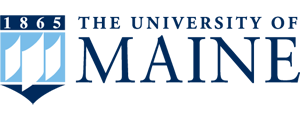News & Events
Local Catch Network launches webinar series on seafood fraud
Stoll presents research on adaptation, leadership, and fisheries licensing at International Marine Conservation Congress in Malaysia (June 2018)
Farr presents research on fishermen’s local ecological knowledge at the International Symposium on the Effects of Climate Change on the World’s Oceans here in DC (June 2018)
Roussell presents research on innovative oyster sorter for small-scale farmers at annual SEANET meeting (May 2018)
Cucuzza presents research on the interplay between ecosystem-based fisheries management and co-management at the Social Coasts Forum in Charleston (February 2018)
Cucuzza featured in UMaine story on fishing community resilience.
New ideas on how social science could change the way we do ocean conservation and management (read more) (October 2017)
Farr to present at upcoming 2017 RARGOM conference on her research on local ecological knowledge among fishermen (October 12, 2017)
Mitchell Center for Sustainability Solutions hosts Tony Charles seminar on successful approaches to community management (September 28, 2017)
Farr and Cucuzza present at international workshop on the integration of ecosystem-based fisheries management and co-management (September 27, 2017)
Community-based aquaculture effort underway in Maine (article) (August 6, 2017)
Conference in Gloucester focuses on building Massachusetts’ seafood system (article) (August 3, 2017)
Shadow markets mask the size of China’s demand for lobster (article) (July 9, 2017)
Research team receives NOAA Fisheries Saltonstall-Kennedy grant to study community resilience in coastal Maine (June 6, 2017)
NOAA Fisheries to support collaborative research to understand local and direct seafood marketing (May 22, 2017)
Mitchell Center for Sustainability awards grant to convene ecosystem-based fisheries management workshop (May 1, 2017)
Maine Sea Grant supports pilot local ecological knowledge research project (April 17, 2017)
Research
Fishing is more than a professional occupation. It is a source of individual and collective identity and the site of complex socioeconomic, cultural, political, and coupled human-natural processes – all of which are in constant flux. This basic observation is the starting point for our research. In particular, we are interested in the interplay between fishermen and marine resources and the tug-of-war between conservation and resource use. How do marine harvesters respond to changes in fish stocks, regulations, and markets? What macro-scale patterns emerge from these individual-level actions? How do they impact fisheries and other marine resources at different spatial and temporal scales? Under what circumstances do these patterns trigger system-wide transformations? To what extent do they influence resilience at the individual and community levels? Our aim in exploring these kinds of questions is to contribute to the theory and practice of sustainable fisheries by helping to inform the development of robust systems that sustain marine resources, especially fisheries, and the communities that depend on them. Our approach to studying these dynamics departs from the traditional armchair approach often deployed by the academic sector. Instead, we seek to position ourselves to study social-ecological dynamics in coastal and marine systems by actively participating in fisheries at different levels. We take this approach because direct experience provides a depth of understanding that is difficult to gain from afar. In particular, experiencing fisheries from multiple vantage points, geographies, and levels provides greater respect for and sensitivity to the diverse perspectives that are invariably tangled in marine resource management and policy in the US. These experiences also provided an opportunity to gain a deeper understanding of the challenges that different sectors face and how issues in marine policy are framed and problematized.
Publications
Peer-reviewed publications
Stoll, J., E. Fuller, B. Crona. Uneven adaptive capacity among fishers in a sea of change. PloS One. 12 (2017): 1-13.
Stoll, J. Fishing for leadership: the role diversification plays in facilitating change agents. Journal of Environmental Management. 199 (2017): 74-82.
Stoll, J. Transforming the fisheries: neoliberalism, nature, and the commons. Invited Book Review. Social & Cultural Geography. 18 (2017): 599-600.
Witter, A. and J. Stoll. Participation and resistance: alternative seafood marketing in a neoliberal era. Marine Policy (Special Issue). 80 (2017): 130-140.
Otto, S., S. Simon, J. Stoll, P. Lawson. Making progress on bycatch avoidance in the ocean salmon fishery using a transdisciplinary approach. ICES Journal of Marine Science 73 (2016): 2380-2394.
Stoll, J., C. Beitl, and J. Wilson. How access to Maine’s fisheries has changed over a quarter century: the cumulative effects of licensing on resilience. Global Environmental Change 37 (2016): 79-91.
Bolton, A., B. Dubik, J. Stoll, and X. Basurto. Describing the diversity of community supported fisheries in North America. Marine Policy 66 (2016): 21-29.
Stoll, J., P. Pinto da Silva, J. Olson, and S. Benjamin. Expanding the geography of resilience in fisheries: Seafood distribution in the Atlantic herring and spiny dogfish fisheries in New England. Ocean and Coastal Management 116 (2015): 185-192.
Stoll, J., B. Dubik and L. Campbell. Local seafood: rethinking the direct marketing paradigm. Ecology and Society. 20 (2015).
Stoll, J., and T. Johnson. Under the banner of sustainability: The politics and prose of an emerging US federal seafood certification. Marine Policy 51 (2015): 415-422.
Campbell, L. N. Boucquey, J. Stoll, H. Coppola, and M. Smith. From vegetable box to seafood cooler: applying the Community Supported Agriculture model to fisheries. Society and Natural Resources 27 (2014): 88-106.
Boucquey, N., L. Campbell, G. Cumming, Z. Meletis, C. Norwood, and J. Stoll. Interpreting amenities, envisioning the future: common ground and conflict in North Carolina’s rural coastal communities. GeoJournal. 77 (2012): 83-101.
Other publications
Stoll, J. “A New Take on Working Waterfront in Coastal North Carolina.” A Sustainability Plan for the Walking Fish Cooperative. (2015).
Stoll, J., and M. Holliday. “The Design and Use of Fishing Communities and Regional Fishery Associations in Limited Access Privilege Programs.” Technical Guidance. U.S. Department of Commerce. NMFS-F/SPO-138. (2014).
Showalter, S., J. Stoll, et al. “Starting and Maintaining Community Supported Fishery Programs: A Resource Guide for Fishermen and Fishing Communities.” National Sea Grant Law Center. NSGLC-12-04-03. (2012).
Learn More:
People
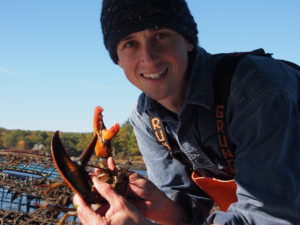
Joshua Stoll: My research focuses on the human dimensions of marine systems and how social-ecological dynamics shape and are shaped by formal and informal institutions. My work aims to be directly relevant to coastal communities and policymakers in Maine and beyond, while also advancing our broader understanding of the concepts of resilience, adaptation, and transformation. I have sought to position myself to engage in this area of work by way of actively participating in different dimensions of fisheries as opposed to being a passive bystander. Through this process, I have had the opportunity to spend multiple seasons as a sternman hauling lobster traps off the coast of Maine; working at a federal salmon hatchery on the Columbia River in Washington State; and being a policy analyst in NOAA Fisheries’ Office of Policy. I have also had the privilege of working with fishermen around the world to develop community-based seafood marketing arrangements and help run LocalCatch.org, an international network of fishermen, researchers, and non-profits engaged in market transformation. These types of direct engagement help to inform my research and are conversely informed by my research in an ongoing and iterative process.
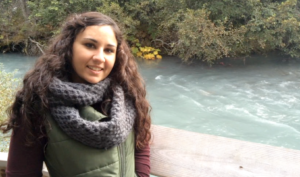
Marina Cucuzza: I have a Bachelor’s degree (2016) from College of the Atlantic in Human Ecology with a concentration in Marine Science. For my dual Masters in Marine Biology and Marine Policy at UMaine, I am interested in exploring the human and environmental dimensions of coastal sustainability. My research focuses on resilience and management of Maine’s fishing communities in the face of ecological and social change. Marina is jointly advised by Heather Leslie.
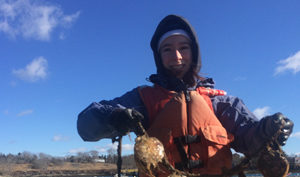
Melissa Britsch: I have an Honors Bachelor’s of Science in biology with a concentration in marine biology from Oregon State University (2017). I am in the dual Masters degree program in Marine Biology and Marine Policy at UMaine and I am interested in studying coastal resilience and the relationships between humans and the environment. I am especially interested in aquaculture policy and how it will affect the potential for aquaculture to increase the resilience of coastal communities. Melissa is jointly advised by Heather Leslie.
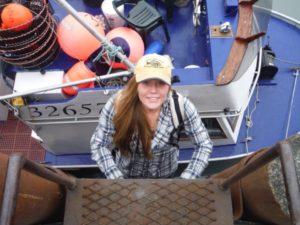
Jaelee Vanidestine: I graduated from Maine Maritime Academy with a B.S. in Marine Science in 2012. I have spent the past six years working in Alaska with the commercial longline halibut and sablefish fleet. I made the move back to the east coast in order to attend the University of Maine and study the coastal issues impacting my home state. I am currently working in Georgetown, ME with a group of oyster aquafarmers to help them develop a structure for a potential oyster cooperative. My overall career goal is to be a part of an agency or association that works with local communities to solve resource related issues.
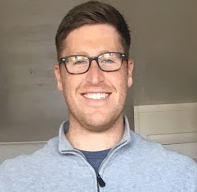
Taylor Witkin: Taylor Witkin is the Strategic Planning and Development Associate for LocalCatch.org and a research associate at the University of Maine. Born, raised, and educated in New England, his interests stem from years of exploring coastlines, marine habitats, and local seafood dishes. Taylor holds a Bachelor of Arts degree from Colby College and a Masters of Marine Affairs from the University of Rhode Island, where he studied the social and ecological roles of community supported fisheries, the drivers behind the local seafood movement, and the potential for a farmed seaweed market in southern New England. Prior to earning his masters degree, Taylor worked in Washington, DC at Oceana, helping launch Global Fishing Watch, a technology platform that tracks industrial-scale fishing fleets, shining a light on illegal, unreported, and unregulated fishing practices. He has also worked on the supply side of the seafood supply chain, as a fish vendor at farmers markets, and has a background in science communications. Taylor’s professional and academic work has been dedicated toward facilitating a trustworthy, resilient seafood system that supports small-scale fishing communities while maintaining a healthy marine environment.
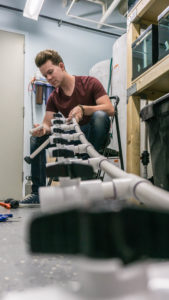
Bryce Risley: Bryce Risley is a second year graduate student at the University of Maine, School of Marine Sciences seeking a dual degree in Marine Biology and Marine Policy. His research focuses on the resilience and adaptive capacity of marine ornamental fisheries which supply live reef organisms to the aquarium industry. Risley’s research consists of domestic and international field work where he interviews marine aquarium trade stakeholders to better understand the challenges they face throughout their supply chain. In addition to this, Risley has constructed a marine aquaculture lab at the university where he conducts physiology experiments on ornamental fish to aid in understanding the adaptive abilities of reef organism collected for the trade.

Sarah Risley: I have a bachelor’s degree from Skidmore College in Environmental Studies. After working for the past five years with food system and food justice nonprofits, I decided to return to school to pursue a career in science research. Before attending an M.S. graduate program this fall, I will be working with Joshua Stoll and collaborating universities to collect data for a case study of small-scale fisheries in the United States. Lead by the FAO and WorldFish, the project, called Illuminating Hidden Harvests, will encompass a comprehensive examination of the social, governmental, and environmental effects of marine small-scale fisheries. This project will merge my research experience with lobsters, a vital fishery in Maine, with my past involvement in food system studies.
Josephine Roussell: I will finish my BSc from the University of Maine this summer (2018) in Marine Science with a minor in Fisheries Science. My human dimensions research interests include coastal zone management; coastal community sustainability and resiliency amidst changing climate regimes; investigating aquaculture as a tool for diversification; as well as design cost and scale appropriate tools for limited purpose aquaculture license holders. Over this past year my passion for researching aquaculture as a tool for economic growth has developed and I wish to understand how to mitigate coastal water user conflicts by ensuring aquaculture doesn’t displace current working waterfronts, but promote resiliency. My primary biological research interest is gelatinous zooplankton and their growing role (as a nuisance) in ecosystems during climate change.
Colin Eimers: Professional Sciences Masters
Amanda Fall: Marine Policy Masters
Former Lab Members
Emily Farr (research fellow)
Prospective Students
We are engaged in interdisciplinary and applied research related to sustainable fisheries, marine and coastal governance, and social-ecological dynamics. I am interested in motivated students who have real-world experience, strong writing skills, and an aptitude for exploration and discovery. If you are interested in joining the team, please do not hesitate to reach out by sending me an email, copy of your CV, and description of your research interests.

